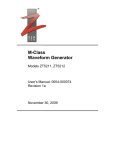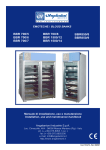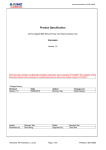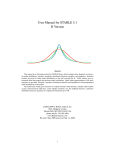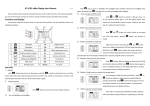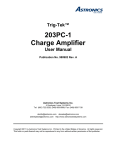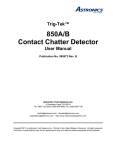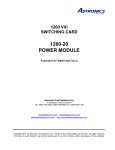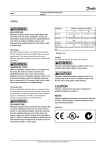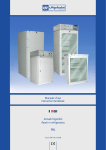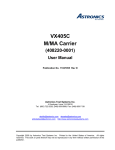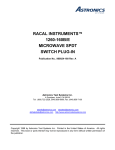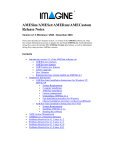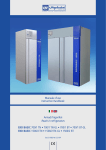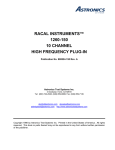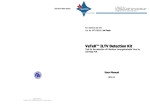Download User Manual - Astronics Test Systems
Transcript
3164 VXI ARB Waveform Generator (VX405C-S-2272) User Manual Publication No. 981002 Rev. A Astronics Test Systems Inc. 4 Goodyear, Irvine, CA 92618 Tel: (800) 722-2528, (949) 859-8999; Fax: (949) 859-7139 [email protected] [email protected] [email protected] http://www.astronicstestsystems.com Copyright 2012 by Astronics Test Systems Inc. Printed in the United States of America. All rights reserved. This book or parts thereof may not be reproduced in any form without written permission of the publisher. THANK YOU FOR PURCHASING THIS ASTRONICS TEST SYSTEMS PRODUCT For this product, or any other Astronics Test Systems product that incorporates software drivers, you may access our web site to verify and/or download the latest driver versions. The web address for driver downloads is: http://www.astronicstestsystems.com/support/downloads If you have any questions about software driver downloads or our privacy policy, please contact us at: [email protected] WARRANTY STATEMENT All Astronics Test Systems products are designed to exacting standards and manufactured in full compliance to our AS9100 Quality Management System processes. This warranty does not apply to defects resulting from any modification(s) of any product or part without Astronics Test Systems express written consent, or misuse of any product or part. The warranty also does not apply to fuses, software, non-rechargeable batteries, damage from battery leakage, or problems arising from normal wear, such as mechanical relay life, or failure to follow instructions. This warranty is in lieu of all other warranties, expressed or implied, including any implied warranty of merchantability or fitness for a particular use. The remedies provided herein are buyer’s sole and exclusive remedies. For the specific terms of your standard warranty, contact Customer Support. Please have the following information available to facilitate service. 1. Product serial number 2. Product model number 3. Your company and contact information You may contact Customer Support by: E-Mail: Telephone: Fax: [email protected] +1 800 722 3262 (USA) +1 949 859 7139 (USA) RETURN OF PRODUCT Authorization is required from Astronics Test Systems before you send us your product or subassembly for service or calibration. Call or contact Customer Support at 1-800-722-3262 or 1949-859-8999 or via fax at 1-949-859-7139. We can also be reached at: [email protected]. If the original packing material is unavailable, ship the product or sub-assembly in an ESD shielding bag and use appropriate packing materials to surround and protect the product. PROPRIETARY NOTICE This document and the technical data herein disclosed, are proprietary to Astronics Test Systems, and shall not, without express written permission of Astronics Test Systems, be used in whole or in part to solicit quotations from a competitive source or used for manufacture by anyone other than Astronics Test Systems. The information herein has been developed at private expense, and may only be used for operation and maintenance reference purposes or for purposes of engineering evaluation and incorporation into technical specifications and other documents which specify procurement of products from Astronics Test Systems. TRADEMARKS AND SERVICE MARKS All trademarks and service marks used in this document are the property of their respective owners. • Racal Instruments, Talon Instruments, Trig-Tek, ActivATE, Adapt-A-Switch, N-GEN, and PAWS are trademarks of Astronics Test Systems in the United States. DISCLAIMER Buyer acknowledges and agrees that it is responsible for the operation of the goods purchased and should ensure that they are used properly and in accordance with this document and any other instructions provided by Seller. Astronics Test Systems products are not specifically designed, manufactured or intended to be used as parts, assemblies or components in planning, construction, maintenance or operation of a nuclear facility, or in life support or safety critical applications in which the failure of the Astronics Test Systems product could create a situation where personal injury or death could occur. Should Buyer purchase Astronics Test Systems product for such unintended application, Buyer shall indemnify and hold Astronics Test Systems, its officers, employees, subsidiaries, affiliates and distributors harmless against all claims arising out of a claim for personal injury or death associated with such unintended use. FOR YOUR SAFETY Before undertaking any troubleshooting, maintenance or exploratory procedure, read carefully the WARNINGS and CAUTION notices. This equipment contains voltage hazardous to human life and safety, and is capable of inflicting personal injury. If this instrument is to be powered from the AC line (mains) through an autotransformer, ensure the common connector is connected to the neutral (earth pole) of the power supply. Before operating the unit, ensure the conductor (green wire) is connected to the ground (earth) conductor of the power outlet. Do not use a two-conductor extension cord or a three-prong/two-prong adapter. This will defeat the protective feature of the third conductor in the power cord. Maintenance and calibration procedures sometimes call for operation of the unit with power applied and protective covers removed. Read the procedures and heed warnings to avoid “live” circuit points. Before operating this instrument: 1. Ensure the proper fuse is in place for the power source to operate. 2. Ensure all other devices connected to or in proximity to this instrument are properly grounded or connected to the protective third-wire earth ground. If the instrument: fails to operate satisfactorily shows visible damage has been stored under unfavorable conditions has sustained stress Do not operate until performance is checked by qualified personnel. Part No. 981002 Rev. A 3164 User Manual Table of Contents Chapter 1 ................................................................................................ 1-1 GETTING STARTED ............................................................................... 1-1 Introduction ......................................................................................................................... 1-1 3164 Input and Outputs ..................................................................................................... 1-5 Coaxial Connectors (Front Panel MCX) ........................................................................... 1-5 J1 Connector I/O (Front Panel 9-Pin Connector) ............................................................ 1-5 LED’s............................................................................................................................... 1-5 3164 MA-Module Arrangement ........................................................................................ 1-6 3164-2 Block Diagram ..................................................................................................... 1-7 3164-4 Block Diagram ..................................................................................................... 1-7 3164-2 to CTI Interface Connections .............................................................................. 1-9 3164-4 to CTI Interface and 3156B Connections .......................................................... 1-10 Chapter 2 ................................................................................................ 2-1 INSTALLATION INSTRUCTIONS ........................................................... 2-1 IInstallation IInstructions ...................................................................................................... 2-1 Unpacking and Inspection ................................................................................................. 2-1 Reshipment Instructions .................................................................................................... 2-1 Hardware Installation......................................................................................................... 2-2 Software Installation .......................................................................................................... 2-2 Installation Prerequisite ..................................................................................................... 2-2 Install Driver ...................................................................................................................... 2-3 Installation Quick Verify ..................................................................................................... 2-3 Chapter 3 ................................................................................................ 3-1 OPERATION ........................................................................................... 3-1 Introduction ......................................................................................................................... 3-1 Hardware Configuration ...................................................................................................... 3-1 Logical Address Selection ................................................................................................. 3-2 MA/M Module Enable ........................................................................................................ 3-3 The User Interface ............................................................................................................ 3-3 Start Up............................................................................................................................... 3-4 Astronics Test Systems i 3164 User Manual Part No. 981002 Rev. A Initializing the Instrument..................................................................................................... 3-5 Channel Control .................................................................................................................. 3-6 Using the Instrument ........................................................................................................... 3-6 Arbitrary Waveform and Sequence Example ....................................................................... 3-7 Errors .................................................................................................................................. 3-9 The Error Message ........................................................................................................... 3-10 Get ADC Result................................................................................................................. 3-10 Run Self Test .................................................................................................................... 3-10 Chapter 4 ................................................................................................ 4-1 SPECIFICATIONS ................................................................................... 4-1 Amplitude Characteristics.................................................................................................... 4-1 Standard Waveform ............................................................................................................ 4-2 Arbitrary Waveform ............................................................................................................. 4-3 Sequenced Waveforms ....................................................................................................... 4-4 Sweep Waveforms (Preliminary) ......................................................................................... 4-4 Sampling Clock Input .......................................................................................................... 4-4 Triggering Characteristics ................................................................................................... 4-5 Front Panel I/O .................................................................................................................... 4-5 Inputs (3164-2: 1 set, 3164-4: 2 sets) ......................................................................... 4-5 Outputs (MCX connectors) ........................................................................................... 4-6 VXIbus Interface Data ......................................................................................................... 4-6 Environmental ..................................................................................................................... 4-6 Chapter 5 ................................................................................................ 5-1 PERFORMANCE VERIFICATION ........................................................... 5-1 Introduction ......................................................................................................................... 5-1 Procedure ........................................................................................................................... 5-1 ii Astronics Test Systems Part No. 981002 Rev. A 3164 User Manual List of Figures Figure 1-1, Figure 1-2, Figure 1-3, Figure 1-4, Figure 1-5, 3164-2 ARB Waveform Generator Front Panel .................................................... 1-3 3164-4 ARB Waveform Generator Front Panel .................................................... 1-4 3164 MA-Module Arrangement ............................................................................ 1-6 3164-2 Block Diagram.......................................................................................... 1-7 3164-4 Block Diagram.......................................................................................... 1-8 Astronics Test Systems iii 3164 User Manual Part No. 981002 Rev. A List of Tables Table 1-1, 3164-2 Signal Interface ......................................................................................... 1-9 Table 1-2, 3164-4 Signal Interface ....................................................................................... 1-10 iv Astronics Test Systems Part No. 981002 Rev. A 3164 User Manual DOCUMENT CHANGE HISTORY Revision A Astronics Test Systems Date 10/23/12 Description of Change Document Control release v 3164 User Manual Part No. 981002 Rev. A This page was left intentionally blank. vi Astronics Test Systems Part No. 981002 Rev. A 3164 User Manual Chapter 1 GETTING STARTED Introduction The 3164-2 and 3164-4 are single-slot VXI module variants of four and two channel 14-bit Arbitrary Waveform Generators (AWG), respectively. For clarity in the following sections we shall refer to the 3164-2 and 3164-4 as the 3164 when referring to both models. An IVICOM driver and Soft Front Panel (SFP) are supplied on installation media for use with the 3164. Note: Some of the screens and menus in the included software may display the model number “S2272” instead of “3164.” There is no issue with this as the software functions the same for the 3164 except you may see the S2272 number. The 3164’s maximum sample rate is 125 MS/s. All waveforms are output from data either previously loaded into waveform memory or loaded during operation. All outputs can operate independently or in locked mode. See Figure 1-1 for a view of the 3164 front panel. Standard waveforms such as Sine, Square, Triangle, Ramp and Pulse are calculated and loaded into waveform memory automatically based on their specified parameters. Pseudo-random Noise (white, quasiGaussian or pink) or a DC level can be generated for a defined or pseudo-random period using only one waveform memory word. AM modulation input is available via the front panel. Also, Sinc(Sin(x)/x) Gaussian Pulse and Exponential Pulse waveforms are available. A large 2-page waveform memory (512K samples/page) is provided so that multiple waveforms can be loaded into memory for fast test execution. One page can be output while the second page is being reloaded with fresh data allowing for real-time operation. Powerful sequencing allows waveform segments to be looped and output in any order. There are provisions for jumping to different sequences based on a trigger input (with or without return). A sync bit can be placed anywhere in the waveform. Similarly, at any point during the output of a waveform, an alternate waveform can be inserted or used to replace the waveform being output for a defined number of samples. Astronics Test Systems Getting Started 1-1 3164 User Manual Part No. 981002 Rev. A The modular design of the 3164 utilizes powerful amplifier modules for the AWG output, making available both high frequency and high power capability. The 3164 contains both MA1710 Amplifier/Attenuator and MA1801AS066 ARB modules. The MA1710 Amplifier/Attenuator output stage has eight fixed software-controlled voltage ranges. The outputs of the MA1801AS066 are connected to the inputs of the MA1710 with its output available as the MAIN OUT A or B (OA or OB), through software-controlled connect/disconnect relays. The desired output of the 3164 is controlled by the driver software that automatically programs the MA1801AS066, selects the appropriate Amplifier/Attenuator range/offset and applies a calibration correction factor to get the desired output signal. The calibration correction factor is derived through a built-in software calibration procedure. The calibration correction factor is stored in nonvolatile EEPROM that is part of the MA1710. Following the calibration procedure, the computed calibration correction factors are stored in this EEPROM and are retrieved and utilized on every subsequent programmed 3164 operation. Getting Started 1-2 Astronics Test Systems Part No. 981002 Rev. A 3164 User Manual MA1710 Slot B MA1710 Slot B J1-A Channel 1A AM input J1-B GND J1-E Channel 2A trigger_2B input J1-F GND J1-K Channel 2A trigger_1B input External clock input Channel 1A Trigger input Channel 1A Trigger output Channel 1A Attenuated waveform output ( : 7) Channel 1A External waveform input Channel 1A Waveform output Reference clock input Reference clock output Channel 1A External sync input Channel 1A Sync output Channel 2A Sync output Channel 2A Waveform output Figure 1-1, 3164-2 ARB Waveform Generator Front Panel Astronics Test Systems Getting Started 1-3 3164 User Manual Part No. 981002 Rev. A MA1710 Slot B MA1710 Slot B J1-A Channel 1A AM input J1-B GND J1-E Channel 2A trigger_2B input J1-F GND J1-K Channel 2A trigger_1B input External clock input Channel 1A Trigger input Channel 1A Trigger output Channel 1A Attenuated waveform output ( : 7) Channel 1A External waveform input Channel 1A Waveform output Reference clock input Reference clock output Channel 1A External sync input Channel 1A Sync output Channel 2A Sync output Channel 2A Waveform output MA1710 Slot D Not used Channel 1B Trigger input MA1710 Slot D J1 Not used Not used Not used Channel 1B External waveform input Channel 1B Waveform output Not used Not used Channel 1B External Sync input Channel 1B Sync output Channel 2B Sync output Channel 2B Waveform output Figure 1-2, 3164-4 ARB Waveform Generator Front Panel Getting Started 1-4 Astronics Test Systems Part No. 981002 Rev. A 3164 User Manual 3164 Input and Outputs The 3164 has the following inputs and outputs Coaxial Connectors (Front Panel MCX) The 3164 front panel coax connectors provide various input and output signals. Refer to Figures 1-1, 1-2, 1-4, and 1-5 for details. J1 Connector I/O (Front Panel 9-Pin Connector) LED’s EC: T1A: TO: O7: IN: OA: External clock input Channel A trigger_1 input Channel A trigger output Attenuated Channel A waveform output (divided by 7) Channel A external waveform input Channel A waveform output RI: RO: SI: SOA: SOB: OB: Reference clock input Reference clock output External sync input Sync output A Sync output B Channel B waveform output J1 Pin Description A: B: E: F: K: J: AM Input GND Channel B trigger_2 input GND Channel B trigger_1 input GND The front panel the following status LEDs. FAIL: This front panel LED indicates the PASS/FAIL (SYSFAIL) status. The LED illuminates during reset, initialization, or if there is a failure on the VX405C carrier itself. MID: This front panel LED illuminates whenever the host processor applies the MODID signal to the slot the module is occupying. Astronics Test Systems Getting Started 1-5 3164 User Manual 3164 MA-Module Arrangement Part No. 981002 Rev. A ACCESS LED Description A: B: C: D: E: F: Not Used MA1710 Module B accessed Not Used MA1710 Module D accessed (3164-4 only) MA1801AS066 Module E accessed MA1801AS066 Module F accessed (3164-4 only) The modular design of the 3164 utilizes MA1801AS066 ARB and MA1710 Amplifier MA-Modules installed into the VX405C Carrier. The figure below details how the MA-Modules arranged in the VX405C Carrier. E MA1710 P1 F B USED ON 3164-4 ONLY MA1710 USED ON 3164-4 ONLY P2 D Figure 1-3, 3164 MA-Module Arrangement Getting Started 1-6 Astronics Test Systems Part No. 981002 Rev. A 3164 User Manual Refer to the block diagram (Figure 1-4) detailing both the 31642 internal wiring/configuration and the external connections to the user CTI Interface. The block depicting the “GUI Channel” is included to indicate the Soft Front Panel (SFP) channel references (1A or 2A) from the pop-down menu found on the SFP. 3164-2 Block Diagram VX405C CARRIER MA1801A Slot E Channel A OA Internal I/O J3 Int Main In A MA1710 SLOT B Selectable Attenuators: Byp, 2:1 (3), 4:1 (2) G=7 O/P Mode: < 2Ω, 50Ω, 75Ω Offset DAC J4-3 SIGOUT1A J1-E (TRIG1A) TA F/P I/O Ext Main In IN Main Out A Main Out/7 Divide By 7 EC RC AWG1 CHA O7 1A ARB-OUT/7 Ext Sync In SI Sync Out A SOA 1A T1A 1A TO 1A AWG1 EXT SYNC Monitor J8 Int TRIG1A Out Trig In 1A J7 J15 AM Out Reference Out J22 Reference Out To/From VXIbus J18 AM In AM Gain/Enable Int Clock Out J11 SPL M-Module Interface Int Main In B Selectable Attenuators: Byp, 2:1 (3), 4:1 (2) EC N/A Ext Ref Out RO N/A Reference In RI N/A Main Out B OB 2A SOB 2A FG_Clock ARB-REF SELF TEST O/P Mode: G=7 1A J1-A Ext Clock In VX405C AWG1 EXT TRIG Pulse Pulse MA1801A Slot E Channel B OB OA 1A Int Sync In A TRIG2A MA1801A Dual Channel AWG CTI Interface A/D Ext Trigger Out AM_A GUI CHNL 1A 1A < 2Ω, 50Ω, 75Ω n/c AWG2 CHA A/D Offset DAC Monitor SIGOUT1B J1-H J4-5 Int Sync In B Sync Out B AWG3 EXT SYNC Pulse (TRIG1B) TB J20 TRIG2B Trigger In 1B Int TRIG1B Out Int TRIG2B Out J4-1 Pulse Trigger In 2B J1-K J1-E 2A 2A AWG3 EXT TRIG ARB-STOPTRIGFSK Figure 1-4, 3164-2 Block Diagram 3164-4 Block Diagram Astronics Test Systems Refer to the block diagram (Figure 1-5) detailing both the 31644 internal wiring/configuration and the external connections to the CTI Interface. The block depicting the “GUI Channel” is included to indicate the Soft Front Panel (SFP) channel references (1A, 2A, 1B or 2B) from the pop-down menu found on the SFP. Getting Started 1-7 3164 User Manual Part No. 981002 Rev. A VX405C CARRIER MA1801A Slot E Channel A OA Internal I/O MA1710 SLOT B J3 F/P I/O O/P Mode: Selectable Int Main In A Attenuators: Byp, 2:1 (3), 4:1 (2) G=7 Offset DAC < 2Ω, 50Ω, 75Ω IN 1A Main Out A OA 1A O7 1A Main Out/7 Ext Sync In Ext Sync In Sync Out A Int Sync In A J4-3 (TRIG1A) TA J8 Int TRIG1A Out MA1801A Dual Channel AWG EC RC AM Out OB AM In AM Gain/Enable Int Clock Out Reference Out J22 Reference Out J18 SOA 1A T1A 1A TO 1A ARB-OUT/7 FROM 3156B CH1_SYNC_OUT AWG1 EXT SYNC M-Module Interface To/From VXIbus VX405C Int Main In B Selectable Attenuators: Byp, 2:1 (3), 4:1 (2) Offset DAC N/A Ext Ref Out RO Reference In RI N/A Main Out B OB 2A SOB 2A AWG1 MRK SYNC FG_Clock TO 3156B REF_IN ARB-REF SELF TEST O/P Mode: G=7 EC N/A SPL AWG1 EXT TRIG TO 3156B TRIG_IN 1A J1-A Ext Clock In J11 MA1801A Slot E Channel B 1A Pulse Pulse J15 SI Trig In 1A Ext Trigger Out J7 AWG1 CHA Monitor TRIG2A AM_A CTI Interface FROM 3156B CH1_MAIN_OUT A/D Divide By 7 SIGOUT1A J1-E GUI CHNL Ext Main In n/c < 2Ω, 50Ω, 75Ω AWG2 CHA A/D Monitor SIGOUT1B J1-H J4-5 Int Sync In B Sync Out B AWG3 EXT SYNC Pulse (TRIG1B) TB Trigger In 1B Int TRIG1B Out J20 Int TRIG2B Out TRIG2B Pulse J3 F/P I/O O/P Mode: G=7 < 2Ω, 50Ω, 75Ω IN 1B Main Out A OA 1B Main Out/7 Divide By 7 Int Sync In A Int TRIG1A Out EC RC 1B Sync Out A SOA 1B AM Out AM In AM Gain/Enable Reference Out J22 Reference Out J18 FROM 3156B CH2_SYNC_OUT AWG2 EXT SYNC T1A 1B TO 1B M-Module Interface Int Main In B Selectable Attenuators: Byp, 2:1 (3), 4:1 (2) Offset DAC N/A Ext Ref Out RO N/A RI N/A Main Out B OB 2B SOB 2B CTI Interface SELF TEST O/P Mode: G=7 EC Reference In SPL VX405C N/A J1-A Ext Clock In To/From VXIbus AWG2 EXT TRIG Pulse Int Clock Out J11 MA1801A Slot F Channel B OB 1B SI Trig In 1A Pulse AM_A MA1801A Dual Channel AWG O7 Ext Sync In Ext Trigger Out J7 AWG1 CHB Monitor (TRIG1A) TA J15 FROM 3156B CH2_MAIN_OUT A/D Offset DAC J4-3 ARB-STOPTRIGFSK GUI CHNL Ext Main In SIGOUT1A J1-E J8 AWG3 EXT TRIG 2A J1-E MA1710 SLOT D Selectable Int Main In A Attenuators: Byp, 2:1 (3), 4:1 (2) OA TRIG2A J1-A J1-K Trigger In 2B J4-1 Internal I/O MA1801A Slot F Channel A 2A < 2Ω, 50Ω, 75Ω n/c AWG2 CHB A/D Monitor SIGOUT1B J1-H J4-5 Int Sync In B Sync Out B FG_Sync Pulse (TRIG1B) TB TRIG2B J20 Trigger In 1B Int TRIG1B Out Int TRIG2B Out J4-1 Pulse Trigger In 2B J1-K J1-E 2B 2B Figure 1-5, 3164-4 Block Diagram Getting Started 1-8 Astronics Test Systems Part No. 981002 Rev. A 3164 User Manual 3164-2 to CTI Interface Connections The connectivity between the 3164-2 and the user CTI Interface is detailed below. The Soft Front Panel channel selection that controls to the signal path is provided in Table 1-1. Table 1-1, 3164-2 Signal Interface 3164-2 Front Panel Signal SFP Channel CTI Interface Signal Connection OA 1A AWG1 CHA O7 1A ARB-OUT/7 SOA 1A AWG1 EXT SYNC T1A 1A AWG1 EXT TRIG AM_IN N/A AWG1 MARK SYNC EC N/A FG_CLOCK RC N/A ARB-REF OB 2A AWG2 CHA SOB 2A AWG3 EXT SYNC TRIG_IN_1B 2A AWG3 EXT TRIG TRIG_IN_2B 2A ARB-STOPTRIGSFK Astronics Test Systems Getting Started 1-9 3164 User Manual Part No. 981002 Rev. A 3164-4 to CTI Interface and 3156B Connections The connectivity between the 3164-4 and the user CTI and 3156B user interfaces are detailed below. The Soft Front Panel channel selection that controls to the signal path is provided in Table 1-2. Table 1-2, 3164-4 Signal Interface 3164-4 Front Panel Signal SFP Channel CTI Interface Signal Connection 3156B Connection IN 1A --- CH1_MAIN_OUT OA 1A AWG1 CHA --- O7 1A ARB-OUT/7 --- SOA 1A AWG1 EXT SYNC --- SI 1A --- CH1_SYNC_OUT TO 1A --- TRIG_IN T1A 1A AWG1 EXT TRIG --- AM_IN N/A AWG1 MARK SYNC --- EC N/A FG_CLOCK --- RO N/A --- REF_IN RC N/A ARB-REF --- OB 2A AWG2 CHA --- SOB 2A AWG3 EXT SYNC --- TRIG_IN_1B 2A AWG3 EXT TRIG --- TRIG_IN_2B 2A ARB-STOPTRIGSFK --- IN 1B --- CH2_MAIN_OUT OA 1B AWG1 CHB --- O7 1B --- --- SOA 1B AWG2 EXT SYNC --- SI 1B --- CH2_SYNC_OUT TO 1B --- --- T1A 1B AWG2 EXT TRIG --- OB 2B AWG2 CHB --- SOB 2B FG_SYNC --- Getting Started 1-10 Astronics Test Systems Part No. 981002 Rev. A 3164 User Manual Chapter 2 INSTALLATION INSTRUCTIONS Installation Instructions Unpacking and Inspection 1. Remove the 3164 module and inspect it for damage. If any damage is apparent, inform the carrier immediately. Retain shipping carton and packing material for the carrier’s inspection. 2. Verify that the pieces in the package you received contain the correct module option and the Users Manual. Notify our Customer Service department. if the module appears damaged in any way. Do not attempt to install a damaged module into a VXI chassis. 3. The 3164 module is shipped in an anti-static bag to prevent electrostatic damage to the module. Do not remove the module from the anti-static bag unless it is in a staticcontrolled area. Reshipment Instructions 1. Use the original packing material when returning the module to Astronics Test Systems for servicing. The original shipping carton and the instrument’s plastic foam will provide the necessary support for safe reshipment. 2. If the original packing material is unavailable, wrap the unit in an ESD Shielding bag and use plastic spray foam to surround and protect the instrument. 3. Reship in either the original or a new shipping carton. Astronics Test Systems Installation Instructions 2-1 3164 User Manual Hardware Installation Software Installation Part No. 981002 Rev. A This instrument will be installed in a VXIbus mainframe in any slot except slot 0 (zero). Prior to installation into the mainframe, the unit’s logical address and addressing mode will be set at the factory as described in Chapter 3 - Logical Address Selection and Chapter 3 - MA/M Module Enable. Apply power. This section explains the operation and features of the MA1710 M-Module Amplifier/Attenuator that is a component of the 3164. The provided software operates on any VXI-based platform with either Windows 2000 Professional SP4 or Windows XP Professional SP2 (or greater 32-bit Windows™ operating system) installed. Note: Some of the screens and menus in the included software may display the model number “S2272” instead of “3164.” There is no issue with this as the software functions the same for the 3164 except you may see the S2272 number. Installation Prerequisite This software utilizes library functions from VXI, VISA and MA1801AS066 VPP driver. As an installation prerequisite, the following software must be installed and verified operable prior to installing the driver software: • • VXI-VISA drivers for the appropriate VXI controller IVI Shared Components (version 2.0 or later) – available from the ivifoundation.org website, if needed For example, software support for a MXI-2 installation requires the following prerequisite software installed: • • • Installation Instructions 2-2 NI-VXI 3.3.1 (or greater) NI-VISA 2.6.1 (or greater) NI-Measurement and Automation 2.2.0.3010 (or greater) Explorer (MAX) Astronics Test Systems Part No. 981002 Rev. A Install Driver 3164 User Manual After the prerequisite software is installed and verified operable, install the provided 3164 Driver (922140-007). Reboot the system per the installation instructions to complete the installation. After rebooting, run NI-Measurement and Automation Explorer and request MAX to search for new devices. This only has to be performed once following the initial installation of the 3164 software. The purpose is to register the software driver as a VISA-compliant virtual device. This step is not required on subsequent system start up. Installation Quick Verify To quickly verify the operation of the newly installed software, perform the following: • • Run VXI Resource Manager RESMAN to initialize VXIVISA software. Run the FP S-2272.Net.exe Soft Front Panel. This is located in >Programs>Racal S-2272 ARB folder. On FPS-2272.Net.exe start up, a panel will appear with available selectable modules appearing in the list box in the S2272 Select panel. Select the 3164 you wish to use. Astronics Test Systems Installation Instructions 2-3 3164 User Manual Part No. 981002 Rev. A This page was left intentionally blank. Installation Instructions 2-4 Astronics Test Systems Part No. 981002 Rev. A 3164 User Manual Chapter 3 OPERATION Introduction Hardware Configuration Astronics Test Systems This section provides the Operator information needed to operate the 3164 in a VXI system. The unit resides in a VXI chassis and is subject to restrictions and benefits of that environment. CAUTION All hardware configurations must be done only while the power to the module is OFF. Operation 3-1 3164 User Manual Logical Address Selection Part No. 981002 Rev. A There are two 8 position switches located inside the module cover. Switch number one is for the Logic Address Selection. It is set for the module by selecting the starting logical address and the desired sequencing (sequential or multiple of 8) of addressing using the toggle switches provided on the carrier. The following is an example of the two eight position switches used: For Logical Address Selection, the following switch settings would already be set at the factory for switch number one and do not require the user to set: Operation 3-2 Position Setting 1 DOWN 2 UP 3 UP 4 UP 5 DOWN 6 DOWN 7 UP 8 UP Astronics Test Systems Part No. 981002 Rev. A MA/M Module Enable The User Interface 3164 User Manual The second 8-position switch is for the MA/M Module Enable and is also located inside the cover of the module. This switch is provided to enable the individual MA/M locations. Again, this switch is already set from the factory as follows and would not require the user to set: Position Setting 1 UP 2 DOWN 3 UP 4 DOWN 5 DOWN 6 DOWN 7 DOWN 8 DOWN The user interface is called FPS-2272.Net.exe. It is a .NET application based on the version 2.0.NET framework, and so this must be installed on the PC in order for the software to run. All of the interactions with the hardware are performed via the supplied IVI-COM driver. If the driver is not installed then the user interface will not be able to operate. Even in simulation mode the underlying driver is required. Astronics Test Systems Operation 3-3 3164 User Manual Start Up Part No. 981002 Rev. A Upon startup of the FPS-2272.Net.exe software, the following screen is displayed: Note: Some of the screens and menus in the included software may display the model number “S2272” instead of “3164.” There is no issue with this as the software functions the same for the 3164 except you may see the S2272 number. Note that if the underlying 3164 IVI-COM driver has not been installed then an error will result. In this example the software has identified that there is one 3164 physically present in the VXI chassis, and two Logical Name entries in the IVI configuration store – one of which is a simulation. By choosing a 3164 and then pressing the Select button the software will attempt to establish communication with the instrument and initiate a session. The Simulate button is there for the case where the user wants to run a simulation without going to the trouble of setting up an instrument entry in the IVI Configuration store. Operation 3-4 Astronics Test Systems Part No. 981002 Rev. A Initializing the Instrument Astronics Test Systems 3164 User Manual On selection of a valid instrument, the software will interrogate it for some standard information: Operation 3-5 3164 User Manual Part No. 981002 Rev. A Channel Control After initialization, the software automatically selects the Channel Control tab. Using the Instrument Slider controls can be used to adjust frequency, amplitude, and offset. These can also be altered by entering a decimal value into the text box below each one which will be applied when ENTER is pressed. In fact whenever there is a text box which accepts text from the user, ENTER must be pressed in order to send that value to the driver. The other areas of operation are performed by typical Windows’ controls, mostly by drop down list boxes. The Working Channel is the channel on which subsequent operations are to be performed. To enable the output of a particular channel, the check box ‘Output Active’ must be checked. As a visual reminder to the user, active channel names will appear in green. Operation 3-6 Astronics Test Systems Part No. 981002 Rev. A Arbitrary Waveform and Sequence Example 3164 User Manual An example of the generation of an arbitrary waveform is provided as well as a sequence. These do everything needed to set up the example on the selected channel, updating the user interface to show the settings made. Please refer to the IVI Specification (available at ivifoundation.org) or the online driver help for details of how to create a sequence or arbitrary waveform. It may also be necessary to refer to the MA1801 documentation also. Here is example code for the Arbitrary Waveform. private void btnArbWvfrmExample2_Clk(object sender, EventArgs e) { try { Ivi.Fgen.Interop.IIviFgen fgen = (Ivi.Fgen.Interop.IIviFgen)m_drvI2272; // put into arb mode lstWaveformMode.SelectedIndex = 1; if (m_arbWfrm2Handle == 0) // just need to create the arb waveform once { double[] dArray = new double[360]; double dData = 0; for (int n = 0; n < 360; n++) { dData = Math.Sin(n * Math.PI / 180); dArray[n] = dData * dData * dData; } m_arbWfrm2Handle = fgen.Arbitrary.Waveform.Create(ref dArray); double dAmplitude = 2; double dOffset = 0; fgen.Arbitrary.Waveform.Configure(lstChannels.Text, m_arbWfrm2Handle, dAmplitude, dOffset); } // for arbitrary waveform the frequency = Sample clock freq / Nos. waveform points // the set_Frequency function calculates the necessary Sampling Frequency based on // the number of points // Note the max sampling frequency is 125MHz, so any calculated frequency above // this will result in an error. double dFreq = 100000; fgen.Arbitrary.Waveform.set_Frequency(lstChannels.Text, dFreq); } catch (COMException ex) { MessageBox.Show(ex.Message); } } Astronics Test Systems Operation 3-7 3164 User Manual Part No. 981002 Rev. A Here is the code for the Arbitrary Sequence from the front panel: private void btnArbSeqExample_Clk(object sender, EventArgs e) { try { // put into seq mode lstWaveformMode.SelectedIndex = 2; Ivi.Fgen.Interop.IIviFgen fgen = (Ivi.Fgen.Interop.IIviFgen)m_drvI2272; // generate the sine wave double[] dSine = new double[720]; double dData = 0; double count = 0; for (int n = 0; count < 360; n++, count+=0.5) { dData = Math.Sin(count * Math.PI/180); dSine[n] = dData; } int[] WfmHandle = new int[2]; WfmHandle[0] = fgen.Arbitrary.Waveform.Create(ref dSine); double[] dTriangle = new double[362]; // generate the triangle for (int n = 0; n <= 90; n++) { dData = n / 90.0; dTriangle[n] = dData; } for (int n = 91; n <= 270; n++) { dData = (180.0 - n) / 90.0; dTriangle[n] = dData; } for (int n = 271; n <= 360; n++) { dData = (n - 360.0) / 90.0; dTriangle[n] = dData; } WfmHandle[1] = fgen.Arbitrary.Waveform.Create(ref dTriangle); int[] loopCount = new int[2]; loopCount[0] = 1; // 2048 orig loopCount[1] = 1; // 5000 orig int hSeq = fgen.Arbitrary.Sequence.Create(ref WfmHandle, ref loopCount); double dAmplitude = 2; double dOffset = 0; fgen.Arbitrary.Sequence.Configure(lstChannels.Text, hSeq, dAmplitude, dOffset); // for an arbitrary waveform the freq = Sample clock freq / Nos. waveform points // Note the max sampling frequency is 125MHz, so any claculated frequency above // this will result in an error. fgen.Arbitrary.SampleRate = 125e6; // to give us a freq. of approx 230kHz. } catch (COMException ex) { MessageBox.Show(ex.Message); } } Operation 3-8 Astronics Test Systems Part No. 981002 Rev. A Errors 3164 User Manual Occasionally an error may be generated. If the error is from the instrument driver it will appear in the status bar at the bottom of the form. In fact the bar’s height will be extended to include the error contents. Here an error has been generated because the user interface is requesting the driver for an amplitude of 17 V when the maximum is 16 V. A subsequent error free driver command will remove the error message. Astronics Test Systems Operation 3-9 3164 User Manual Part No. 981002 Rev. A The Error Message A careful look at the error message will reveal the following: 1. The ViStatus error number -1074003966. 2. The origin of the error (in this case from the 1801 arb in Slot E) 3. The decode of the error (in this case ‘Parameter 2 out of range’) 4. The driver function which reported the error In this case it is a wrapped driver error. This will be the most common error because the IVI-COM driver provides a wrapped interface to a lower level driver. In other words the IVI-COM driver itself calls a lower level driver to communicate with certain hardware. Get ADC Result Pressing this button results in the output being disconnected and routed instead to the internal analog to digital converter. A measurement is made with this device and the signal then re-routed to the output. It is primarily used by the Self Test capability of the instrument. Run Self Test The self test exercises the major functions of the instrument. During this time, the user interface will be disabled until the self test is complete. If the self test fails, it will return with a reason for the failure, otherwise it will simply return “Pass”. Operation 3-10 Astronics Test Systems Part No. 981002 Rev. A 3164 User Manual Chapter 4 SPECIFICATIONS Amplitude Characteristics 50 Ω mode into 50 Ω load, unless stated otherwise. Amplitude 3 mV - 16 Vpk-pk into 50 Ω 6 mV - 32 Vpk-pk into 1 MΩ Resolution 3.5 digits AC Accuracy 1 1% of setting + 1% of Range (at 1 kHz and specified output) Amplitude Ranges (50Ω Vpk-pk) R1: 3 mV – 125 mV R2: >125 mV – 250 mV R3: >250 mV – 500 mV R4: >500 mV - 1.00 V R5: >1.00 V - 2.00 V R6: >2.00 V - 4.00 V R7: >4.00 V - 8.00 V R8: >8.00 V - 16.00 V DC Offset Range (50Ω mode, 50Ω load) 0 to ± 8 V DC Offset Accuracy 1% of setting ± 16 mV Low-Pass Filter 50 MHz, 7-pole, elliptic Standby (Output disconnected) Output On or Off Output Protection Short circuit Astronics Test Systems Specifications 4-1 3164 User Manual Part No. 981002 Rev. A Standard Waveform (Sine, Triangle, Square, Pulse, Ramp, Noise, DC) Frequency Resolution 4 digits Accuracy 50 ppm (internal crystal) Jitter < 30 ps rms Sine Function Frequency Range 1 mHz to 25 MHz Total Harmonic Distortion (THD) (1 to 15 Vpk-pk) 20 Hz to 100 kHz: < 0.25% Harmonics < 5 MHz: > 45 dBc < 10 MHz: > 40 dBc < 25 MHz: > 40 dBc (filter on) Flatness <100 kHz: < 0.1 dB <1 MHz: < 0.2 dB <10 MHz: < 1 dB <20 MHz: < 2.5 dB <25 MHz: < 3.5 dB SFDR (SCLK = 100 MHz) < 1 MHz: > 50 dBc Crosstalk (fc = 10 MHz) -70 dB, typical Phase Range 3 0 to 360º Triangle/Ramp Function Frequency Range 1 mHz to 10 MHz Phase Range 3 0 - 360º Square Wave/Pulse Function Frequency Range 1 mHz to 25 MHz Specifications 4-2 Astronics Test Systems Part No. 981002 Rev. A 3164 User Manual Duty Cycle Range 2 & 3 1% - 99.9% Rise/Fall Time <10 ns (20% to 80%) <15 ns (10% to 90%) Noise and DC Function Types White, quasi-gaussian or pink noise or DC Generation Real-time, pseudo-random Period Pre-defined (min and max samples specifiable) or pseudo-random Arbitrary Waveform Waveform Memory 1 Meg per channel Memory Operation One page can be outputting data while the other page is being reloaded with new data. Vertical Resolution 14 bits Minimum Segment Size 2 points Segments/Channel 1 to 512 Notes 1. Measured with AC RMS Voltmeter 2. Subject to minimum pulse width 3. Subject to Sampling Clock Frequency Astronics Test Systems Specifications 4-3 3164 User Manual Sequenced Waveforms Sequencer Step Limits Segment Loops Sweep Waveforms (Preliminary) Part No. 981002 Rev. A 1 to 512 1 to 64 k or continuous Sweep Range Sine: 1 mHz to 25 MHz Square: 1 mHz to 20 MHz Triangle: 1 mHz to 10 MHz Waveforms Sine, square, triangle Spacing Linear, Logrithmic Direction Up or down Sweep Duration 200 µs to 335 s Sampling Clock Input Frequency Resolution 4 digits Accuracy 50 ppm (internal crystal) Jitter <30 ps rms Internal Source Range 1 Hz to 125 MHz External Source Range Up to 100 MHz External Source Characteristics Specifications 4-4 • Connector: Front Panel MCX Range: 50 mVpk-pk to ±5 V • Threshold: ±4.75 V, programmable • Impedance: 50 Ω Astronics Test Systems Part No. 981002 Rev. A 3164 User Manual Reference Clock Internal Reference 10 MHz ±50 ppm External Reference Impedance: 50 Ω to 10 kΩ Range: 50 mVpk-pk to ±10 V Threshold: ±4.75 V, programmable Triggering Characteristics Sources External: 50 mVpk-pk to ±10 V Input Impedance: 50 Ω or 10 kΩ Level (Programmable): ±9.75 V Resolution: 5 mV Accuracy: 100 mV VXI Backplane: TTLTRG0-7 Maximum Trigger Frequency DC to 20 MHz Minimum External Trigger Pulse Width 20 ns Trigger Slope Positive or negative Trigger Delay 0 to 128k points (multiple of 2) System Delay (trig/gate input to waveform output) 20 ns + 7 Sample Clock Sync/Marker Output Front Panel: TTL VXI Backplane: TTLTRG0-7 Sync Width: 1 to 4097 points, programmable individual memory words within a segment. Front Panel I/O (accessed with MCX and Positronics connectors) Inputs (3164-2: 1 set, 3164-4: 2 sets) Astronics Test Systems • Trig In 1 A (T1A): MCX, ZIN = 10 kΩ, ±9.75 V • Ext Clk In (EC): MCX, ZIN = 50 Ω, ±5 V • Ext Waveform In (IN): MCX • Ext Sync In (SI): MCX • Ref Clk In (RI): MCX, ZIN = 50 Ω, 50 mV to 20 Vpk-pk • AM In: Positronic 9-pin, 1 kΩ, 2 Vpk-pk for 90% depth • Trig In 1B, 2B (T1A, T1B): Positronic 9-pin, ZIN = 10 kΩ, ±9.75 V Specifications 4-5 3164 User Manual Outputs (MCX connectors) (3164-2: 1 set, 3164-4: 2 sets) Part No. 981002 Rev. A • Waveform (OA, OB): MCX, ZOUT = <5 Ω, 50 Ω, or 75 Ω • Waveform/7 (O7): MCX, ZOUT = 650 Ω • Sync (SOA, SOB): MCX, LVTTL • Trig Out (TO): MCX • Ref Clk Out (RO): MCX, ZOUT = 50 Ω VXIbus Interface Data Single slot, Register Based, VXIbus 1.4 Compliant Drivers IVI-COM, IVI-C, LabVIEW™, VXIplug&play support for frameworks based on Microsoft Win32® application programming interface Cooling (10°C Rise) 4.3 l/s @ 0.45mm H2O Peak Current & Power Consumption +24 +12 +5 -12 -24 IPm(A) 0.75 0.32 2.1 0.45 0.75 Total Peak Power: 55 Watts Environmental Temperature Operating: 0°C to 50°C Storage: -40°C to 70°C Humidity (non-condensing) 5 to 95% Weight 3164-2 3164-4 2.5 lb. (1.2 kg) 3.2 lb. (1.5 kg) MTBF (ground benign) 3164-2 3164-4 18,999 hours 11,197 hours EMC (Council Directive 89/336/EEC) Emission: EN61326-1: 1997+ A1:1998, Class A Immunity: EN61326-1:1997+ A1:1998, Table 1 Safety (Low Voltage Directive 73/23/EEC) BS EN61010-1:1993/A2 1995 Specifications 4-6 Astronics Test Systems Part No. 980905-003 Rev. A VX405C-3164 User Manual Chapter 5 PERFORMANCE VERIFICATION Introduction The 3164 has eight independent ranges (Range1 – Range8). Each channel and range has been calibrated independently. Calibration factors are stored in the EEPROM for each channel and include four calibration gain factors: 1. 2. 3. 4. Procedure The AC Gain The 0V DC Offset The DC Gain for positive voltages The DC Gain for negative voltages The following procedure verifies the 3164 has been properly calibrated and meets specifications. If the unit fails any of the following tests, it should be returned to the factory for repair. 1. AC Gain The AC Gain is verified by measuring a sine wave in each range of the 3164 using the following parameters: Waveform Frequency Amplitude Output Sine 1 kHz 60% point in the range (see following table) On The peak AC output voltage is verified on a DMM. For each channel of the AWG, program the 3164 AWG to the values in the following table. Measure the AC peak output voltage with a DMM and verify the measured value is within the specified limits. Astronics Test Systems Performance Verification 5-1 VX405C-3164 User Manual Part No. 980905-003 Rev. A Range R1: 3 mV-125 mV R2: >125 mV-250 mV R3: >250 mV-500 mV R4: >500 mV-1.00 V R5: >1.00 V-2.00 V R6: >2.00 V-4.00 V R7: >4.00 V-8.00 V R8: >8.00 V-16.00 V Programmed Value 76.2 mV 200 mV 400 mV 0.8 V 1.6 V 3.2 V 6.4 V 12.8 V Low Limit High Limit 74.188 mV 195.5 mV 391 mV 0.782 V 1.564 V 3.128 V 6.256 V 12.512 V 78.212 mV 204.5 mV 409 mV 0.818 V 1.636 V 3.272 V 6.544 V 13.088 V 2. 0 V DC Offset The 0 V DC Offset is verified by programming each channel to a sine wave with zero amplitude and zero offset. The DC offset is verified using a DMM. The following setup is programmed for each channel: Waveform Frequency Amplitude Offset Output Sine 1 MHz 0V 0V On Set each channel of the 3164 to a 1 MHz sine wave with zero volt amplitude. Set the DC offset to 0 V. Measure the DC 0V offset and verify it is within + 16 mV. Programmed Amplitude 0V Programmed DC Offset 0V Offset Low Limit -16 mV Offset High Limit 16 mV 3. DC Gain (+) The DC Gain (+) is verified by setting each channel to a sine wave with a zero volt amplitude and specified offset. The DC offset is verified with a DMM. The following setup is programmed for each channel: Waveform Frequency Amplitude Offset Output Sine 1 MHz 0V per following table On Measure the DC output with a DMM to verify offset is within the limits specified in the following table. Performance Verification 5-2 Astronics Test Systems Part No. 980905-003 Rev. A Programmed Amplitude 0V 0V 0V 0V 0V 0V 0V 0V VX405C-3164 User Manual Programmed DC Offset 1.0 V 2.0 V 3.0 V 4.0 V 5.0 V 6.0 V 7.0 V 8.0 V Offset Low Limit 0.974 V 1.964 V 2.954 V 3.944 V 4.934 V 5.924 V 6.914 V 7.904 V Offset High Limit 1.026 V 2.036 V 3.046 V 4.056 V 5.066 V 6.076 V 7.086 V 8.096 V 4. DC Gain (-) The DC Gain (-) is verified by setting each channel to a sine wave with a zero volt amplitude and specified offset. The DC offset is verified with a DMM. The following setup is programmed for each range in turn: Waveform Frequency Amplitude Offset Output Sine 1 MHz 0V per following table On Measure the DC output with a DMM to verify the offset is within the limits specified in the following table. Programmed Amplitude 0V 0V 0V 0V 0V 0V 0V 0V Astronics Test Systems Programmed DC Offset -8.0 V -7.0 V -6.0 V -5.0 V -4.0 V -3.0 V -2.0 V -1.0 V Offset Low Limit -8.096 V -7.086 V -6.076 V -5.066 V -4.056 V -3.046 V -2.036 V -1.026 V Offset High Limit -7.904 V -6.914 V -5.924 V -4.934 V -3.944 V -2.954 V -1.964 V -0.974 V Performance Verification 5-3 VX405C-3164 User Manual Part No. 980905-003 Rev. A This page was left intentionally blank. Performance Verification 5-4 Astronics Test Systems













































